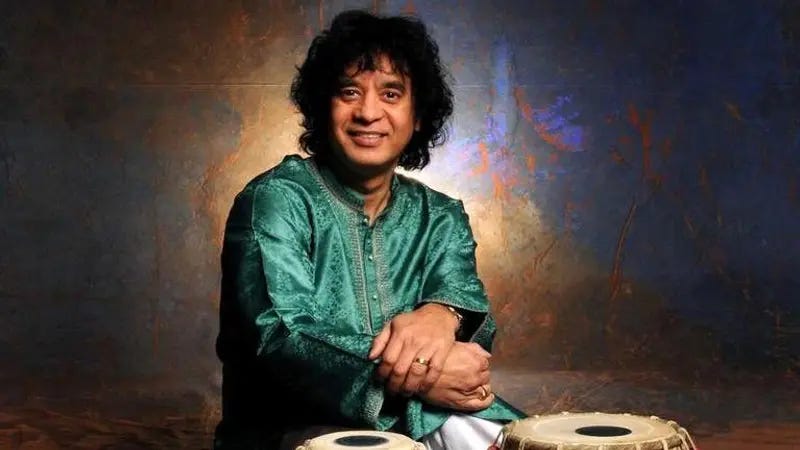Renowned Tabla Maestro Ustad Zakir Hussain Passes Away at 73
Beyond his contributions to music, Zakir Hussain left an indelible mark on popular culture. His memorable advertisement for Taj Mahal Tea, with the now-iconic line, "Wah Ustad, nahi... Wah Taj boliye!
Renowned Tabla Maestro Zakir Hussain Passes Away at 73
San Francisco, California: The world of music mourns the loss of legendary tabla maestro Zakir Hussain, who passed away on December 15, 2024, at the age of 73. Ustad Zakir Hussain had been admitted to a hospital last week due to heart-related ailments, and his condition was reported as critical before his untimely demise. A four-time Grammy Award winner and recipient of numerous national honors, Hussain's passing marks the end of an era in Indian classical music. His death is not just a loss for the music world but for millions of fans all across the globe, who admired his artistry and his ability to connect cultures through his music.
Life and Career
Born in 1951 to tabla virtuoso Ustad Alla Rakha, Zakir Hussain displayed exceptional musical talent from an early age, performing professionally by the age of seven. Over six decades, he established himself as a global ambassador of Indian classical music. He gained widespread acclaim for his remarkable skill, precision, and ability to convey deep emotion through the tabla.
Hussain collaborated with world-renowned artists such as Pandit Ravi Shankar, John McLaughlin, and George Harrison. He co-founded the fusion band Shakti in 1970, creating a unique blend of Indian classical music and jazz. His work transcended performance; he also composed music for films like Heat and Dust and In Custody, as well as for ballet and orchestral productions.
Awards and Recognition
Zakir Hussain was the recipient of numerous accolades, including:
Padma Shri (1988)
Padma Bhushan (2002)
Padma Vibhushan (2023)
Multiple Grammy Awards for his groundbreaking work in world music
Legacy of Ustad Alla Rakha
Zakir Hussain's father, Ustad Alla Rakha, was a legendary figure in Indian classical music and a pioneering tabla maestro. Born on April 29, 1919, in Ghagwal, Jammu and Kashmir, Alla Rakha began his musical journey at a young age, leaving home at 13 to pursue his passion.
Alla Rakha was instrumental in introducing Indian classical music to Western audiences, frequently accompanying Pandit Ravi Shankar in their global performances. Known for his rhythmic precision and creativity, he earned acclaim as one of the most innovative tabla players in history.
For Zakir Hussain, his father was not only a legendary musician but also his first and most important guru. Alla Rakha instilled in him a deep love and understanding of tabla and Indian classical music. The elder Hussain passed away on February 3, 2000, at the age of 80, leaving behind a rich musical legacy that Zakir Hussain carried forward with great distinction.
A Cultural Icon Beyond Music
Beyond his contributions to music, Zakir Hussain left an indelible mark on popular culture. His memorable advertisement for Taj Mahal Tea, with the now-iconic line, "Wah Ustad, nahi... Wah Taj boliye!", remains etched in public memory as a tribute to his genius and an iconic celebration of artistry. The ad not only showcased his cultural influence but also made him a household name far beyond the confines of classical music.
A Loss Beyond Borders
Hussain’s unmatched ability to bridge cultural and musical divides made him a revered figure worldwide. His death is mourned not just by the Indian music fraternity but by millions of fans across continents, who cherished his artistry and his role in popularizing Indian classical music on a global scale. His passing is a profound loss, not only to Indian classical music but to the global artistic community.
Personal Life
Zakir Hussain is survived by his wife, Antonia Minnecola, and their two daughters, Anisa Qureshi and Isabella Qureshi. Antonia Minnecola is a Kathak dancer and teacher, who also served as Hussain's manager. Their elder daughter, Anisa, is a filmmaker and graduate of UCLA, while Isabella is currently studying dance in Manhattan. The family has been deeply involved in the arts, carrying forward a legacy of creativity and cultural richness.
As the maestro himself once said, “Music has no boundaries; it is the language of the soul.” His tabla will forever resonate with the rhythm of a legacy that transcends time, inspiring generations to come.





He is still alive